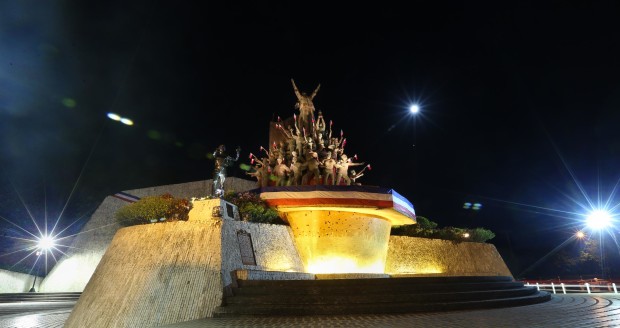
The People Power Monument on Edsa, right outside Camp Aguinaldo. (File Photo by LYN RILLON/Philippine Daily Inquirer)
Updated: 10:35 p.m., Feb. 24, 2017
In black shirts, students belonging to various groups and school faculty members will join the protests Saturday morning at the People Power Monument in Quezon City and in the afternoon at the Libingan ng mga Bayani in Taguig.
#BlockMarcos movement, a youth group which opposes the burial of President Ferdinand Marcos at the Libingan ng mga Bayani and the possible resurgence of another Marcos-style dictatorship under the Duterte administration, is organizing a rally at the People Power Monument , where other youth groups are expected to join.
The #BlockMarcos movement will hold a caravan to the Libingan ng mga Bayani afterwards to demand the exhumation of the Marcos’s remains at the Libingan.
Also joining are students from the Ateneo de Manila University, University of the Philippines, Cavite State University, Pamantasan ng Lungsod ng Maynila, members Samahan ng Progresibong Kabataan (SPARK), and Student League Against Marcos (SLAM).
SLAM is a group of 1,000 high school student members formed on Facebook – all of them opposing Marcos.
The groups have been consistently expressing dismay over the burial of Marcos at the Libingan, starting with an impromptu gathering at the People Power Monument last Nov.18, even holding a martial law conference a month later.
Another step towards revisionism
Ignacio Villareal, one of the founders of SLAM, said the Palace’s simple celebration of Edsa inside Camp Aguinaldo, is another move of the current administration to forward historical revisionism and downplay the damage done during the martial law era.
“The simple rites is (done) probably so that a reinstatement of authoritarianism would be more politically palatable in the greater scheme of things,” Villareal, a 12th grade student from Xavier School in San Juan, said.
Villareal, captain of his school’s debate team, is the grandson of the late House Speaker Cornelio Villareal.
Joanne Lim of SPARK agreed with Villareal, saying the move to hold it in Camp Aguinado is an “attempt to downplay the gravity of the people’s dissent from the Marcos dictatorship, the human rights violations and widespread poverty during his time.”
“It is important to stress, especially with forces aiming to distort it, that Marcos’s fall from power was not just borne out from a rivalry between political families but rather a product of the peoples’ desire for the restoration of democracy,” Lim added.
She cited the anti-poor economic policies passed during the time of Marcos, such as Presidential Decree 442, which allowed the enforcement of contractualization, and Presidential Decree 232, which legitimized the rise of the cost of private tertiary education – both of which were still enforced by administrations after the dictatorship.
“It is a scalding insult to say that the Marcos dictatorship is something we should already move on from irregardless of the non-deliverance of justice to the victims during martial law and as our generation of the youth remains to have to pay up till 2025 for the $26.7 billion foreign debt incurred by Marcos instead of relegating them for funding basic social services,” she said.
Refusing to move on
Earlier on Wednesday, the Block Marcos movement, lifted a “Hukayin!” banner at the People Power Monument, which, according to the group’s spokesman Kat Leuch, is a symbolic reminder that there are people who still refuse to move on.
The banner, Leuch said in a statement, is a sign “that we do not give up the fight to democracy, and remind the Marcoses their patriarch will not rest in peace at the Libingan ng mga Bayani until justice is served.”
Leuch, a second year UP law student, noted that the youth should also continue the struggle of the youth’s parents and grandparents, especially now that President Rodrigo Duterte is apprently following in Marcos’s footsteps by pushing for strongman measures.
The group expects more people to join them in reclaiming the Edsa People Power revolution and carrying the struggle for freedom on Saturday.
‘We must not live int he past’
Beata Carolino, vice chair of the UP Student Council, said prior to the Saturday event, university students had already held several protests condemning martial law.
This Friday, they held a forum with key people who participated in the 1986 EDSA revolt, such as Sen. Francis Pangilinan and journalist Raisa Robles.
Student organizations also organized programs tackling contemporary events in connection with martial law, such as extrajudicial killings, the resintatement of the death penalty, and media censorship.
The UP Diliman community will march down EDSA for Saturday’s protest commemorations, Carolino said.
She said the Palace’s choice to hold the commemoration of EDSA inside a military camp was ironic.
“In way, I agree with (presidential spokesperson Ernesto) Abella’s statement: We must not live in the past,” she said. “And that means that we need to realize that the problems in the past have not ceased to exist at present. We need to stop living in the past in order to face the truth that the past and the present are not entirely different.”
Martial law is supposedly over but Filipinos continue to experience massive abuses, she said. But landlessness, lack of jobs, and human rights violations are current realities.
“The fight of EDSA revolt is not yet over,” Carolino said. “Democracy is accessible not to everyone, especially not the poor.”
She found it “questionable” and “even worth condemning” that the Duterte administration had not held the Marcoses accountable for their abuses.
Meanwhile, students and faculty members of the Ateneo de Manila University will be at the People Power monument from 4 p.m. to midnight, said Randy Tuano,professor from the Economics Department, who helped mobilize students online.
Issues about human rights, historical truth and justice will be discussed at the monument. A mass will also be held at La Salle Greenhills at 1 p.m. /atm
RELATED VIDEOS

